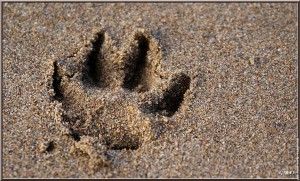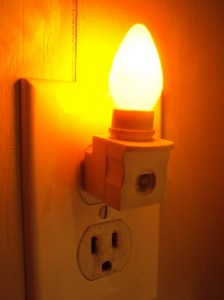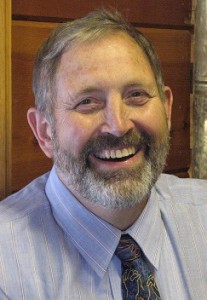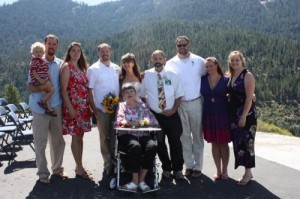Recently our beach had been made smooth by wild winds, then had been doused with rain, making it much like a chalkboard ready for writing on. By the time Jack and I arrived, a menagerie had already been there and written their stories on the sand. We “read” that most of the neighborhood critters began their mornings with creek cocktails.
Jack sniffed enthusiastically as we identified the prints of seagulls, raccoons, rabbits, deer, fox, and coyotes at the water’s edge. Even tiny insects had left winding trails in the sand. I wished I’d been camouflaged in the dunes at dawn, able to watch these critters quench their thirst. How did they all get along? But then we saw the true story by way of the deer prints. Walking toward the water, hoof marks were spaced evenly, about 18” apart, but as the prints left the creek, they were 5’ apart! Apparently thirst was quenched in successive drinking shifts, and the animals knew enough not to drink together.
Nearby there was a sandy story different from all the others: the boots of a man. His steps were made by larger feet than any of the animals, detailing a story of dominance and power.
Scripture says human beings were created to be different than animals, not just in footprints, capabilities and intellect, but in likeness. While animals were all likened to their own species, humans were likened to God. Such incredible elevation made us unique and privileged, part of which was to receive eternal souls.
The Creator gave animals natural instincts to help them. Squirrels know to store up food in the fall, and birds know to migrate south before it snows. Bears know to hibernate until spring, and deer know to run from coyotes.
But when God created people, he decided on reasoning power instead of instinct. Thus we can weigh alternatives and consider consequences. Best of all we can make our own choices. Our decision-making sometimes gets us into trouble, but we still value it highly.
As God watches us making our choices, he always hopes we’ll do it with wisdom, which inevitably leads to him. But sometimes what he sees is animals choosing more wisely than humans, and I’m sure that disappoints him. Critters know enough to run from danger, but people often run right into it.
If Jesus had been walking on our beach this week, my guess is his steps would have made smooth sandal prints. Scripture urges us to follow behind those steps, not necessarily on the sand but as described in his Word. This can be difficult, since we don’t usually know where he’s leading us. But one thing is sure. If we follow his lead, we’ll be much better off than if we tell a sandy story of our own making.
“The Lord directs our steps, so why try to understand everything along the way?” (Proverbs 20:24)




